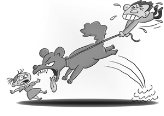题目内容
— Oh, you sounded just like a native.
— ______. I still have trouble expressing myself.
A. Well, not quite
B. I don’t care
C. Yes, you’re right
D. I’m glad you like it
练习册系列答案
相关题目
天津市养宠物的家庭越来越多,对此,“天津中学生英语报”组织了一场讨论:城市内是否可以养宠物。请参考下图的各类信息,介绍讨论情况,并说明自己的观点和建议。
注意: 词数不少于100字;
可以适当增减情节,使行文连贯;
开头已经写好。
支持养宠物 | 反对养宠物 | 你的观点 |
| | …… |
Recently we had a heated discussion on whether people should keep pets at home in cities.
.
.
.
.
.
.







